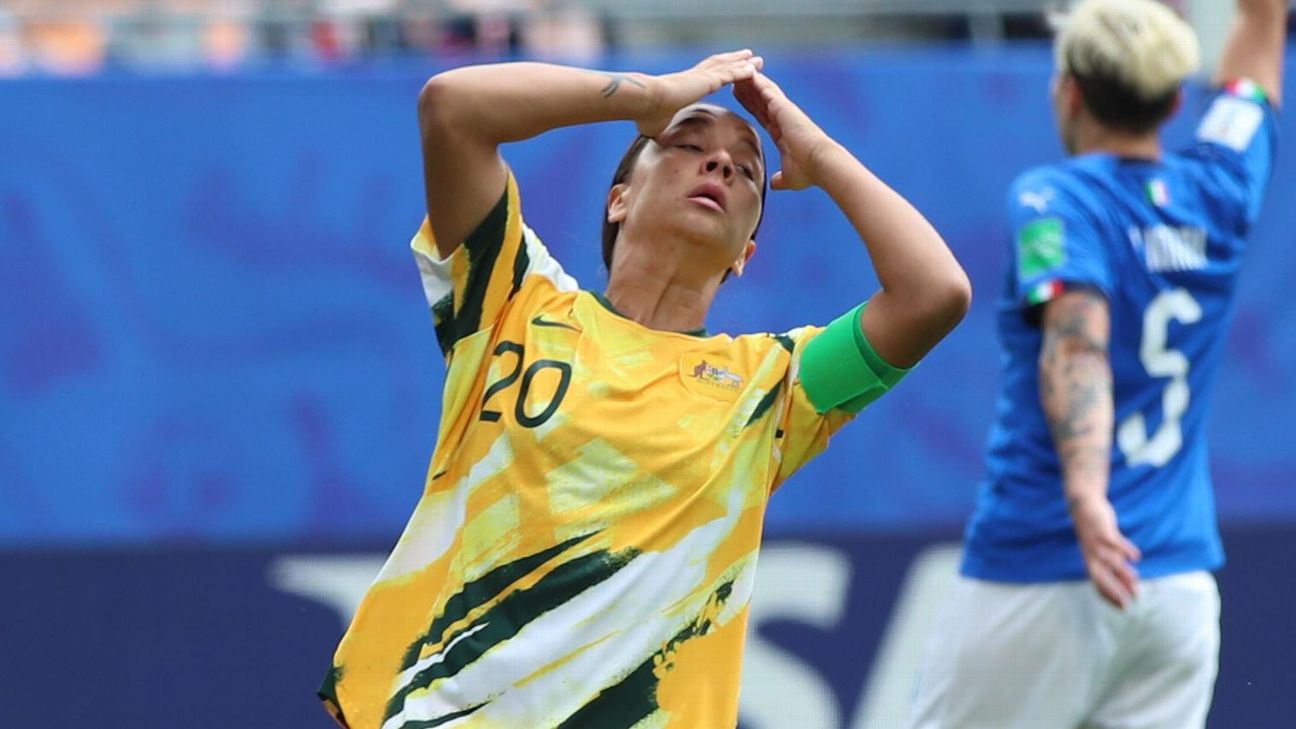VALENCIENNES, FRANCE — In the end, it was the Italian Azzurre, not the Waltzing Matildas, who danced.
As the Australian players walked to their sideline and shook hands with their coaches and the game’s referees, visibly stunned after a 2-1 defeat in their opening match of the Women’s World Cup on Sunday, the Italian players gathered in front of their fans, where they cheered and shouted and danced the Macarena.
It was Italy’s first win — and first appearance — at the Women’s World Cup in two decades, earned on a Barbara Bonansea header in the 95th minute, off a free kick in the final seconds of stoppage time.
“It’s disappointing, but the World Cup is far from over,” Australian captain Sam Kerr said after the match. “This game is gone now. We can’t ponder a loss and we wouldn’t have pondered a win. We have to focus on our next game against Brazil. They’re a good team and we’ve had a good rivalry with them. It won’t be easy, but we’ve got to win that game now.”
Australia entered this World Cup with an internal team dialogue that read much more upbeat than the media stories that followed them to Valenciennes. Having dropped two straight matches for the first time since 2016, the Matildas have looked little like the medal threat they did earlier this year, but continued to insist they were ready to take on the best teams in the world. Of course, those recent losses came in friendlies, World Cup tune-ups against the United States (5-3) and the Netherlands (3-0). The results didn’t matter, but what the team — and the rest of the world — learned from those losses very much did.
That education continued on Sunday. Here are five takeaways from Australia’s loss to Italy:
Australia’s back line has been problematic.
The Matildas have conceded eight goals in those two losses. On Sunday, the Aussie defense struggled yet again, which is worrisome considering Kerr’s offense is not scoring like expected.
“We’ve been working on that line and we need to have a better understanding of when to drop and when to stay high, and the position of our goalkeeper,” head coach Ante Milicic said after the game. “We struggled at times, but I still think we created a lot more opportunities than the opposition, so it’s disappointing to not come away with at least a point tonight.”
The Matildas are struggling on set pieces.
In the end, a free kick did them in.
“We practice heaps and heaps on them, but set pieces seem to be an issue for us defensively,” said forward Lisa DeVanna, who is playing in her fourth WWC for the Matildas. “This loss is upsetting. I still believe we’re the golden generation. That doesn’t change. We just have to tighten up on a few things and fix [our set piece play] against Brazil. Brazil will be a tough game, mentally, physically and emotionally. They’re a team we constantly play and they’re a tournament team. We really need to dig deep for this next one.”
Change is good — and might be necessary.
Since taking over the program in March, Milicic has repeatedly said his squad is a work in progress, that it will not mold to fit the playing style of its opponents and that it will stick to playing fast-paced and passing out from the back. But Sunday, it was the Italians who controlled the pace of the game in much the same way the Netherlands did last week.
“We expected that [from Italy],” Milicic said. “They took the rhythm out of it, but we need to overcome that. Teams are going to do that a lot more to us.”
Italy consistently pressured the Australians when it played out of the back. Bonansea jumped on a poor first touch from Aussie defender Clare Polkinghorne on the run and scored Italy’s opening goal in the 65th minute. Still, Milicic said to expect the same style of play against Brazil.
“We are not going to change our style because we got caught at the back [for Italy’s first goal],” he said. “We will always build up from the back.”
Reviews of the review system are mixed.
Ask the Italians, who had two goals wiped on VAR-confirmed offsides calls, and their opinions might mirror that of their fans, who booed loudly during the game stoppages. For fans, the process is confusing. Unlike replay used in the NFL, the live crowd is not privy to what’s happening during the stoppage and the referee does not announce the outcome over a loudspeaker. VAR is a television-friendly addition to the game, but it has few fans in the stadium.
There were bright spots for Australia.
Goalkeeper Lydia Williams made several body-sacrificing saves; Kerr scored the first World Cup goal of her career, honoring Aussie legend Tim Cahill with his famed “corner flag punching celebration”; and 19-year-old Ellie Carpenter was superb all around. The youngest player in the Matildas’ starting XI, the defender was the most consistently solid and fleet-footed performer all afternoon.
On the team’s overall play and their potential going forward, Milicic said, “We understand that we have the potential to get through to the next stage. We’ve just decided to go about it the long and hard way. Maybe that’s the Australian way. We’ll stare it straight in the eyes and we’ll go for it.”
